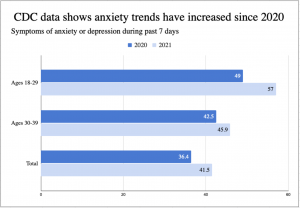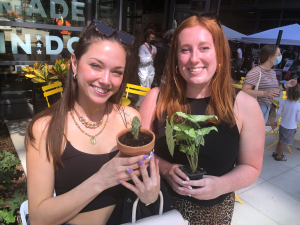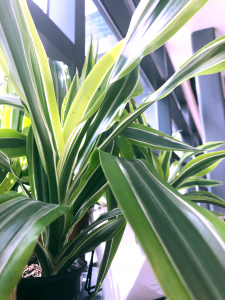A young married couple started their local Noma plant business, PLNTR, over the pandemic and are helping D.C. residents add more green space to their homes and overcome mental stress.
Residents said becoming ‘plant parents’ is helping them decrease anxiety and stress levels.
Jacqueline Hase, a local D.C. resident, said since the pandemic, she feels people have become very internal, and gardening helps her combat stress and connect more to nature.
“It really does give me a chance to disconnect from the indoor life,” said Hase.
Since 2020’s lockdown, the pandemic and its indirect mental health effects continue to increase. According to a recent CDC study, symptoms of anxiety, depression and other mental health issues are growing. The data collected from Aug. 19, 2020, to Feb. 1, 2021, showed a 5% increase in anxiety and depression among adults.

Source: Household Pulse Survey data collection from Aug. 19, 2020- Feb. 12, 2021. Research data posted to Morbidity and Mortality Weekly Report (MMWR) on cdc.gov.
Washington, D.C. ranks high compared to other cities, which indicates adults in D.C. have a higher rate of mental illness, according to recent data from Mental Health America.
Mary Margaret, Behavioral and Health Promotion Manager at 98point6 Inc., said there is a significant amount of research showing how “forest bathing” or immersing oneself in nature can lower your physical heart rate, lower your cortisol levels and improve your experiences of well being.
One of the ways plants promote well-being is through horticulture. The American Horticultural Therapy Association (AHTA) defines horticultural therapy as the process where participants enhance their well-being through plant-related activities.
Perla Sofía Curbelo Santiago, certified horticulture therapist and member of the AHTA, said horticulture therapy can be used in a variety of ways to promote wellness, including therapy offices, hospitals and rehabilitation. Research shows specific bacteria in soil, such as the infamous mycobacterium vaccae, can boost the human brain’s serotonin levels, much like antidepressants or SSRIs.

James said the inspiration behind PLNTR started when his wife Caitlin gave him his first plant when they began dating. Since then, they have grown their plant family at home to 120 plants. (Elise Kline/ The Wash)
James and Caitlin Beach, owners of PLNTR, started their business in July of 2020.
They started sharing their mission, to bring joy to people’s lives through plants, with the Noma community a few weeks ago when Shop Made DC opened its new location in Union Market. James and Caitlin are vendors for Shop Made DC, and they also host pop-up events in Union Market.
At one of their recent interactive gardening events, local residents said they were excited to welcome more plants and green space into their homes.
“It’s one of those things that I don’t think you can ever have too many,” said D.C. resident Kimberly Yates.
James said one of the reasons the ‘plant’ parenthood trend continues to be so popular during the pandemic is because human beings have a natural instinct and desire to be around plants.
“At our base, we are mammals, right — we are monkeys when it comes down to it, and we started in the forest,” said James. “And even though we have evolved into a bit of a concrete forest, we want to be back — we still want to be around the green.”
He said the lockdown forced people to think about how their home space impacts their energy and mental well-being.

Local Noma residents Courtney Bye and Taylor Carvalho said they each parent over 30 plants in their home spaces. (Elise Kline/ The Wash)
Local program manager Courtney Bye said her green space helps serve as a meditation zone where she can unwind and decompress from anxiety and stress.
“Having more green space in my home makes me feel more connected to the outside,” she said, “and comforted.”
Taylor Carvalho, local Associate at a clean energy company, said she feels it’s important to curate your space and have plants around, especially with many D.C. residents still working from home.
Carvahlo also said the caretaking and plant parenting aspect is very comforting.
“Something that comes to mind for me is, responsible for something you choose to be responsible for and not like a forced obligation which is really nice and peaceful,” said Carvalho.
Curbelo Santiago said the time you spend nurturing a plant also serves as a time where you nurture yourself by putting your worries aside and getting fresh air, water and sunlight.
According to Margaret, plants are a reminder to slow down and think about the elements needed to thrive. She said just like plants need light, the human body needs to experience natural circadian rhythms—the internal process that regulates one’s sleep cycle to wake cycle.

Curbelo Santiago said that making time for physical breaks, using the restroom, eating a meal, showering, are equally as important as taking mental health breaks or what she calls “garden breaks.” (Elise Kline/ The Wash)
Curbelo Santiago said having plants in your home ultimately provides a space for mindfulness and reflection, a space to try and de-stress or even be vulnerable and let yourself fall apart.
“You feel part of something bigger, so you start building yourself up and you cope better for whatever the day brings you,” said Curbelo Santiago.















Add comment